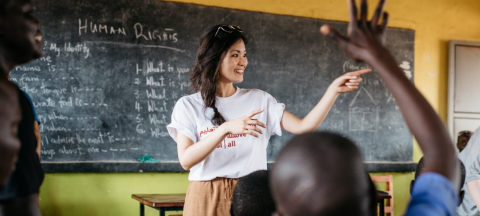
GCED Basic Search Form
Quick Search
أنت هنا
الأخبار

Global citizenship education (GCED) is critical to sustainable development. It encourages the acquisition of skills, values, attitudes and behaviours that empower learners to assume active roles to face and resolve global challenges, and to become proactive contributors to a more peaceful, tolerant, inclusive and secure world.
GCED has three core dimensions of learning.
- First, cognitive skills that enable the acquisition of knowledge, understanding and critical thinking about global issues, as well as the interdependency of countries and different populations.
- Second, socio-emotional learning that encourages a sense of belonging to a common humanity, sharing values and responsibilities, as well as empathy, solidarity and a respect for diversity.
- Third, behavioural skills to act responsibly at a local, national and international level to build a more peaceful and sustainable world.
GCED supports SDG Target 4.7, which focuses on the knowledge and skills needed to promote sustainable development. While definitional approaches provide much needed conceptual frameworks for what we mean by ‘global citizens’, it is equally important to understand some of the ways by which individuals go through their personal transformation to become ‘global citizens’. Being a global citizen requires a process to understand, empower and act.
Too often, theory fails to turn into practical sustainable change. Education Above All (EAA) Foundation’s, four programmes support projects in a range of areas that provide valuable lessons for promoting global citizenship, and good examples of linking theory and practice.
1. EAA’s Reach Out to Asia (ROTA) Programme has a focus on youth empowerment with initiatives on integrating training, dialogue, and action to foster global citizenship among young people across various contexts. Its MENA Youth Capacity Building in Humanitarian Action (MYCHA) Initiative has trained youth to design and implement positive contributions in crisis-affected settings.
ROTA’s EMPOWER initiative has supported young people to form youth-led clubs, identify issues facing their community, and develop their own service projects to address these issues. The ROTA International Volunteer Trips use intercultural exchange to broaden young people’s global perspectives on citizenship. Each of these initiatives has increased youth perception that their actions can make a difference, and encouraged their service to society. A key lesson is that taking action is essential because it builds transformational leadership skills and provides opportunities for youth to deepen skills through multiple practice opportunities for learning, action, and reflection.
2. Al Fakhoora has a similar focus on the agency of youth and works to provide them with the skills, knowledge, and experience to become civic-minded individuals who act in the broader interest of their communities. Its focus makes a crucial connection that global citizenship requires civic mindedness. Al Fakhoora has provided Gaza-based students with a comprehensive, multi- stage civic leadership programme to become positive, inspirational global citizens. An analysis of the structure of that programme provides some wider lessons for supporting youth living in conflict/post conflict settings, as well as how a GCED-focused curriculum can inspire and empower students to become agents of change within their own communities.
The Al-Fakhoora approach includes both theory and actualization, based on the belief that knowledge without practice leads to unfulfilled potential. Another core lesson is that local context matters, and youth needs vary across regions, requiring a flexible tailored approach to curriculum rather than a ‘one size fits all’ approach. This flexibility has enabled the programme to be adapted when applied in partnerships with UNDP and SPARK in the contexts of the West Bank, Turkey, Lebanon, Jordan and Iraq.
3. Educate A Child (EAC), launched in 2012 with the initial goal of enrolling 10 million out of schoolchildren (OOSC), works with partners in different contexts to reach the OOSC in marginalized communities. A number of EAC projects in India (Educate Girls), Pakistan (ILMPOSSIBLE), and Uganda (Building Tomorrow), have promoted global citizenship through youth volunteers sensitizing and mobilizing local communities on the need for education for their children. The volunteers are trained in skills such as community mobilization, empathy, problem solving, decision-making and leadership. The volunteers - known as Team Balika in India, ILM Ambassadors in Pakistan and BT Fellows in Uganda - work with families, communities, schools and education programmes to identify out of school children and then enrol them into an education programme. The youth have gained useful skills such as critical thinking and communication that empower them to serve their communities and look for solutions to local problems. The acquired skills are beneficial to the individual too, as they help build confidence when they apply for college or in their work place.
4. In Northern Uganda and South Sudan, the Protect Education in Insecurity and Conflict programme (PEIC) worked to provide art based workshops in Bidi Bidi Refugee Settlement in Northern Uganda, and with the Whitaker Peace and Development Initiative to ensure that youth living in conflict-affected communities had knowledge of human rights, the rule of law and the importance of the right to education. The programme also developed advocacy skills to give them voice and to build peace. The PEIC experience showed that whilst the current focus of SDG 4.7 on curriculum, teachers and the classroom is crucial, it is also important for global citizenship to have a wider reach through volunteering peacebuilding programmes that are outside the formal classroom. Participant agency and control over defining values such as tolerance, diversity and peace through ‘a bottom up’ approach rooted in local contexts is also essential to ensure a deeper commitment to values of global citizenship by the whole community.
EAA’s field-based experiences provide a ‘snap shot’ of ‘promising practices’ of what global citizenship programmes can achieve through partnerships and concerted field-based programmes. As well as the individual lessons learned within each of the programmes, a more general lesson is that global citizenship in practice, which pays attention to local contexts and takes seriously the voices and experiences of those who are on their own journey to becoming global citizens, will be the basis for a sustainable world.
URL:
